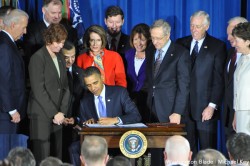National
Top story of 2011: ‘Don’t Ask’ is history
Gay service members rejoin military, come out after anti-gay law disappears


President Obama signed the repeal of ‘Don’t Ask, Don’t Tell’ in December 2010, but it didn’t take effect until September 2011. (Blade photo by Michael Key)
The anti-gay law known as “Don’t Ask, Don’t Tell” finally came to an end on Sept. 20 after prohibiting open gays from serving in the U.S. military for 18 years.
No other news event had as much impact on the LGBT community as the lifting of the ban — allowing an estimated 66,000 gay people to begin serving openly — which is why we’re naming the end of “Don’t Ask, Don’t Tell” as the story of the year for 2011.
The law came to an end thanks to repeal legislation that President Obama signed into law in December 2010. The bill provided for an end to “Don’t Ask, Don’t Tell” after 60 days passed following certification from the president, the defense secretary and the chair of the Joint Chiefs of Staff.
After months of training and preparing service members for open service, Obama and defense leaders sent notification to Congress that they had certified an end to “Don’t Ask, Don’t Tell” on July 22. In accordance with the repeal legislation, the ban was lifted 60 days later from the books.
Alex Nicholson, executive director of Servicmembers United, said the end of “Don’t Ask, Don’t Tell” was the result of “persistent hard work of unwavering advocates, especially those who have been directly impacted by this issue, and some courageous politicians over the past six years.”
“As a result, those who continue to serve can sleep easier tonight knowing that they can no longer be arbitrarily fired because of their sexual orientation,” Nicholson said. “Justice has prevailed and ‘Don’t Ask, Don’t Tell’ is dead.”
According to Servicemembers United, an estimated 14,346 service members were discharged under “Don’t Ask, Don’t Tell” over the course of 18 years before the ban was lifted.
Aubrey Sarvis, executive director of the Servicemembers Legal Defense Network, called the end of “Don’t Ask, Don’t Tell” a “historic milestone along the journey to achieving LGBT equality in America’s military.”
“Thanks to veterans, active duty, leaders, allies and supporters everywhere, this is a monumental day for our service members and our nation,” Sarvis said. “Indeed, we have taken a tremendous leap forward for LGBT equality in the military.”
In the wake of lifting the ban, a number of service members who had previously kept their sexual orientation hidden made public the fact that they are gay. Air Force 1st Lt. Josh Seefried, co-director of the group OutServe who formerly went under the alias J.D. Smith, was among those who made his sexual orientation known.
Seefried, a New Jersey-based finance director for the Air Force, said during a news conference on Sept. 20 that being able to take part fully in the military family was particularly important to him.
“That’s what the military brags about so much is having that aspect of being part of the family, being part of the team,” Seefried said. “I almost resented the Air Force for not giving me that opportunity to be part of that team, not being able to bring someone to an event. Now I feel like I can go back to work and I can be part of that team now and actually be honest.”
Capt. Sarah Pezzat, a D.C.-based Marine Corps reservist who served in operations in Haiti, Iraq and Somalia, said at the same event that the end of “Don’t Ask, Don’t Tell” made Sept. 20 feel markedly different than previous days.
“For me, it feels different because I’ve been waiting for this day for a long time,” Pezzat said. “I can post about it on Facebook, I can tell my co-workers if I want to what I did last weekend, things like that.”
The end of “Don’t Ask, Don’t Tell” preceded a number of other firsts for the U.S. military after the implementation of open service. For example, at the Marine Corps balls throughout the country where attendees celebrated the service’s 236th birthday, gay Marines attended with same-sex partners for the first time.
Observers have also said the end of the military’s ban would make gay service members more visible, and, in turn, build on efforts to advance same-sex marriage or employment non-discrimination protections for LGBT people.
Jeff Krehely, director of the LGBT research and communications project at the Center for American Progress, said prior to the lifting of the ban that open service would be significant for many Americans — not just those in the military.
“‘Don’t Ask, Don’t Tell’ repeal is huge and tremendous, but I think there are much larger implications for society because a lot of people really respect the military,” Krehely said.
Federal Government
UPenn erases Lia Thomas’s records as part of settlement with White House
University agreed to ban trans women from women’s sports teams

In a settlement with the Trump-Vance administration announced on Tuesday, the University of Pennsylvania will ban transgender athletes from competing and erase swimming records set by transgender former student Lia Thomas.
The U.S. Department of Education’s Office for Civil Rights found the university in violation of Title IX, the federal rights law barring sex based discrimination in educational institutions, by “permitting males to compete in women’s intercollegiate athletics and to occupy women-only intimate facilities.”
The statement issued by University of Pennsylvania President J. Larry Jameson highlighted how the law’s interpretation was changed substantially under President Donald Trump’s second term.
“The Department of Education OCR investigated the participation of one transgender athlete on the women’s swimming team three years ago, during the 2021-2022 swim season,” he wrote. “At that time, Penn was in compliance with NCAA eligibility rules and Title IX as then interpreted.”
Jameson continued, “Penn has always followed — and continues to follow — Title IX and the applicable policy of the NCAA regarding transgender athletes. NCAA eligibility rules changed in February 2025 with Executive Orders 14168 and 14201 and Penn will continue to adhere to these new rules.”
Writing that “we acknowledge that some student-athletes were disadvantaged by these rules” in place while Thomas was allowed to compete, the university president added, “We recognize this and will apologize to those who experienced a competitive disadvantage or experienced anxiety because of the policies in effect at the time.”
“Today’s resolution agreement with UPenn is yet another example of the Trump effect in action,” Education Secretary Linda McMahon said in a statement. “Thanks to the leadership of President Trump, UPenn has agreed both to apologize for its past Title IX violations and to ensure that women’s sports are protected at the university for future generations of female athletes.”
Under former President Joe Biden, the department’s Office of Civil Rights sought to protect against anti-LGBTQ discrimination in education, bringing investigations and enforcement actions in cases where school officials might, for example, require trans students to use restrooms and facilities consistent with their birth sex or fail to respond to peer harassment over their gender identity.
Much of the legal reasoning behind the Biden-Harris administration’s positions extended from the 2020 U.S. Supreme Court case Bostock v. Clayton County, which found that sex-based discrimination includes that which is based on sexual orientation or gender identity under Title VII rules covering employment practices.
The Trump-Vance administration last week put the state of California on notice that its trans athlete policies were, or once were, in violation of Title IX, which comes amid the ongoing battle with Maine over the same issue.
New York
Two teens shot steps from Stonewall Inn after NYC Pride parade
One of the victims remains in critical condition

On Sunday night, following the annual NYC Pride March, two girls were shot in Sheridan Square, feet away from the historic Stonewall Inn.
According to an NYPD report, the two girls, aged 16 and 17, were shot around 10:15 p.m. as Pride festivities began to wind down. The 16-year-old was struck in the head and, according to police sources, is said to be in critical condition, while the 17-year-old was said to be in stable condition.
The Washington Blade confirmed with the NYPD the details from the police reports and learned no arrests had been made as of noon Monday.
The shooting took place in the Greenwich Village neighborhood of Manhattan, mere feet away from the most famous gay bar in the city — if not the world — the Stonewall Inn. Earlier that day, hundreds of thousands of people marched down Christopher Street to celebrate 55 years of LGBTQ people standing up for their rights.
In June 1969, after police raided the Stonewall Inn, members of the LGBTQ community pushed back, sparking what became known as the Stonewall riots. Over the course of two days, LGBTQ New Yorkers protested the discriminatory policing of queer spaces across the city and mobilized to speak out — and throw bottles if need be — at officers attempting to suppress their existence.
The following year, LGBTQ people returned to the Stonewall Inn and marched through the same streets where queer New Yorkers had been arrested, marking the first “Gay Pride March” in history and declaring that LGBTQ people were not going anywhere.
New York State Assemblywoman Deborah Glick, whose district includes Greenwich Village, took to social media to comment on the shooting.
“After decades of peaceful Pride celebrations — this year gun fire and two people shot near the Stonewall Inn is a reminder that gun violence is everywhere,” the lesbian lawmaker said on X. “Guns are a problem despite the NRA BS.”
New York
Zohran Mamdani participates in NYC Pride parade
Mayoral candidate has detailed LGBTQ rights platform

Zohran Mamdani, the candidate for mayor of New York City who pulled a surprise victory in the primary contest last week, walked in the city’s Pride parade on Sunday.
The Democratic Socialist and New York State Assembly member published photos on social media with New York Attorney General Letitia James, telling followers it was “a joy to march in NYC Pride with the people’s champ” and to “see so many friends on this gorgeous day.”
“Happy Pride NYC,” he wrote, adding a rainbow emoji.
Mamdani’s platform includes a detailed plan for LGBTQ people who “across the United States are facing an increasingly hostile political environment.”
His campaign website explains: “New York City must be a refuge for LGBTQIA+ people, but private institutions in our own city have already started capitulating to Trump’s assault on trans rights.
“Meanwhile, the cost of living crisis confronting working class people across the city hits the LGBTQIA+ community particularly hard, with higher rates of unemployment and homelessness than the rest of the city.”
“The Mamdani administration will protect LGBTQIA+ New Yorkers by expanding and protecting gender-affirming care citywide, making NYC an LGBTQIA+ sanctuary city, and creating the Office of LGBTQIA+ Affairs.”




















